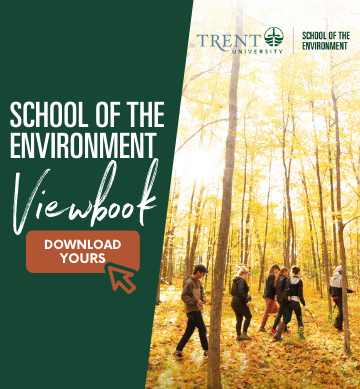The Agronomists World Academy Foundation (AWAF) invited Raul Ponce-Hernandez to participate in an international event, PRODUCTIVITY AND SUSTAINABILITY on July 6, 2022, to present "Technology Innovations for Food Security and Sustainability: A New Paradigm."
The theme of the panel discussion was sustainability. How is this taken from the classroom to the field?
Ponce-Hernandez: "From my own experience in teaching and can only talk about my personal experience as instructor and researcher in Trent School of the Environment. For the last 5 years, with the support of the Naraine Fund, we have teamed up with local farmers to search for the design and testing of the "climate change resilient farm of the future (2050)". We have worked on different component sub-systems of the designed conceptual farming system, particularly on:
- The use of technology for the assessment, monitoring, and management of the farm under extreme climatic events (mainly droughts and excess of rain and its impact on soil erosion), and the status of soil and plant nutrients
- Experimentation with the use of satellite imagery and drone multi-spectral and thermal infra-red imagery for the mapping of: the spatial variability of the status of soil and plant nutrients (Nitrogen, Phosphorous) and the relation to crop chlorophyllic activity and health, as well as the detection of plant stress due to absence of soil moisture (drought) from thermal infra-red imagery generated from drones
- The design of the climate change - resilient farm of the future: "Permaculture" model and experimenting with different (type and quantity) composts and manures as soil amendments and source of nutrients; effects of different land cover crops on soil erosion
We are presently working on all other sub-system elements of the climate-resilient farming system of the future, e.g. the design of a renewable energy source for the farm (solar, wind and enteric fermentation-biogas and Vertical Farming: year-round production of vegetables in vertical greenhouse with sensor-controlled supply of water and nutrients and light.
In all these efforts the involvement of undergraduate and graduate students, mostly from TSE classes, have been crucial to achieving results in the field. Undergraduate students from TSE, Biology, and other units have been involved in field descriptions and mapping of farm soils as practica in ERSC 3650H "Soil Management and Conservation", and in exercises involving sustainable land management proposals of the studied soils, using remote sensing technology from drones and GIS. In all these efforts there are in-class and in-lab discussions based on the conceptual understanding of the principles of sustainability, systems analysis followed by field activities.
Finally, through the course ERSC 4640H "Integrated Watershed Management," we undertake a comprehensive analysis of all systems part of a watershed (water, soils, vegetation, land-use, etc.), then we have solicited practical projects in collaboration with conservation authorities in Ontario, or from other countries (e.g. Mexico, Cuba, Brazil, etc.). Teams of students then develop integrated watershed management plans of sustainable resource management, and then provide the results in a well-organized report. Sometimes these are resented at ad-hoc Seminars. All the above is with the topic of sustainability principles in mind.
One of the discussions led to evaluate the need for more instruction on critical thinking and how does that relate to sustainability?
Critical thinking is fundamental in the approach to problem-solving. The design of the climate resilient farm of the future can be seen as a complex problem with many component sub-systems to design (problems to solve) , based on:
- Clean renewable energy
- Minimum of external inputs (maximizing recycling of both energy and materials)
- Restorative principles (contribute to the restoration of carbon and nutrient cycles)
When we work on these sub-problems on the classroom (e.g. ERSC 3650H Soil management and Conservation, and ERSC 4640H and GEOG 3020H), we work on this thinking informally. However, the thinking tools we use are content-independent. The thinking involved is more important than recourse to its bases in knowledge, for problem-solving. We have these discussions in class and workshops. Usually and informally using approaches found in critical thinking (e.g. "Teaching Thinking" by E. De Bono, "The Art of Thinking in Systems" by S. Schuster, "Good reasoning matters" by Leo A. Groarke, Trent's President, and C.W. Tindale)
This thinking relates to sustainability in that the unsustainable systems we have now are the result of short-term, selfish, greedy thinking, and the responsible for the major disruption of the natural cycles in the biosphere, notably the carbon cycle, causing climate change, the environmental contamination of ecosystems and the ocean pollution causing all biodiversity decline and species extinction. These are all the result of faulty and/or biased thinking. The result of not thinking about systems and their components against the background of the natural Biospheric cycles and their implicit laws of thermodynamics (conservation of matter, the conservation of energy and the state of entropy or degree of organization of the systems)."




